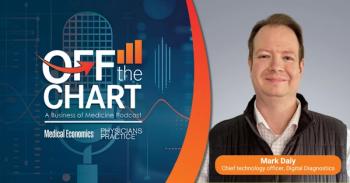
Online: ‘Yup, I’m a Junkie. And Proud of It.’
Interested in getting a line on how to use trendy applications to your advantage? Mitchell L. Cohen, MD, explains how practices can snag good deals on Internet auction sites.
OK, I admit it. I’m an eBay junkie. Browsing, buying, selling - it’s all good. I’d buy more online if I could, but my nurse keeps interrupting me to insist I see patients.
You’d be an eBay junkie, too, if you knew the rush of watching the clock count down to the moment an auction closes to see if anyone has dared to outbid you.
Let me tell you how I got this way:
It all started with a Christmas gift. My sister-in-law, knowing my affinity for antique medical paraphernalia, bought me an old Schell doctor’s bag in wonderful condition. I logged onto to eBay later that Christmas day and I saw how many antique doctors’ bags were for sale, as well as many of the other medical antiques on the site; I was hooked. Antique surgical instruments, textbooks, journals, and instruments filled the Web pages. Hours could be spent, and were spent, perusing the odds and ends.
In a matter of minutes, I signed up for my free eBay account and quickly made my first bid on an item. It was for eight small labels meant to go on medication bottles from a couple of old mom-and-pop pharmacies. The labels were for a range of old apothecary items such as formaldehyde, camphorated oil, paregoric, and chloroform liniment. I thought they’d look great framed and in my office. I placed my bid of a whopping $10. When nobody outbid me, I felt the high of making my first eBay purchase.
From there I found myself searching eBay at least a few times a week during lunch and between patient visits for unique tidbits from medicine’s past, but my obsession didn’t stop there. You see, eBay has modern medical instruments and equipment for sale as well. Anything that goes into a modern physician’s office can be found there. Pulse oximeters, EKG machines, ultrasound equipment, and even scrubs are available to bid on and purchase. I bought an old (but never used) HP Sprague-Rappaport stethoscope. This gem, which I spent six months looking for, has not been made for a few years now and was quite the hot commodity among us regular searchers.
I’m not the only physician with an eBay addiction. One of the residents I teach said that he regularly sells items when he’s strapped for cash at the end of the month. Need to pay the electric bill? Sell the ophthalma-scope/otoscope set that was never used. Want to go out for a nice dinner? Put up that old pathology textbook.
Many physicians’ offices struggle with what to do with used equipment that works well but is somewhat outdated. Online auctions are a means to unload such items to offset the cost of the upgrade. Getting set up to sell an item is somewhat more complicated than purchasing one, but still it can usually be done during a lunch break.
Getting out the digital camera and taking some well-framed pictures is the first and most important step in listing an item; pictures do speak a thousand words. What the pictures of the item do not show, the item’s description needs to make up for. Include basics such as the brand name, model number, and its age. Other helpful tidbits for the buyer are the item’s history (number of owners, etc.), its condition, and any unique bells and whistles worth noting.
You’ll certainly want to be paid for what you sell, and getting set up with PayPal is probably the easiest and most secure means to allow the buyer to use a credit card for the purchase. Others accept checks or money orders, but that delays the transaction, which can lead to muddied waters and second thoughts. eBay and other online auctions sites will want their cut, too. For business and industrial capital equipment such as ultrasound machines or X-ray developers, eBay charges a $20 listing fee and a 1 percent commission on the total sale price (up to $250). For other items, a $5 insertion fee is charged, plus a graded final value fee based on the sale price of the item, starting at 5.25 percent.
Caution: Whenever dealing on the Internet, security hazards, including maliciously fraudulent Web sites, can be an issue. These sites look very real, but are only trying to collect credit card information.
For questionable e-mails, the eBay security center, which helps with transactions gone bad and online fraud, can often help sort out the fraudulent from the legitimate. Also, you may, from time to time, purchase an item that doesn’t live up to the seller’s promises. Buyer feedback scores help steer people away from disreputable sellers and motivate such sellers to resolve their problems. After a three-month search for my new stethoscope, I thought I had found and purchased the real thing. But when I received the item, I discovered it was a knock-off. Happily, the seller didn’t want his feedback score to go down and was honestly mistaken about the origin of the stethoscope and took it back without a problem. For sellers, PayPal offers a simple way to ensure that you get paid the agreed-upon price.
The online auction world does not end with eBay, however. Amazon, Yahoo, and other Web sites offer eBay-style “flea market” auctions that virtually connect buyers and sellers, while retail auction sites actually sell items themselves. Be sure to select reputable online auction sites that include maintaining security as an important part of their role in the transaction.
So if you dare to dabble in online auctions for medical equipment or memorabilia, tread carefully. You may discover that you’re your own worst enemy. You just might turn into an eBay junkie yourself.
Mitchell L. Cohen, MD, is a family physician in Elma, Wash., and an adjunct faculty member at the Providence St. Peter Hospital Family Medicine Residency Program in Olympia, Wash. He can be reached via
This article originally appeared in the September 2007 issue of Physicians Practice.
Newsletter
Optimize your practice with the Physicians Practice newsletter, offering management pearls, leadership tips, and business strategies tailored for practice administrators and physicians of any specialty.






